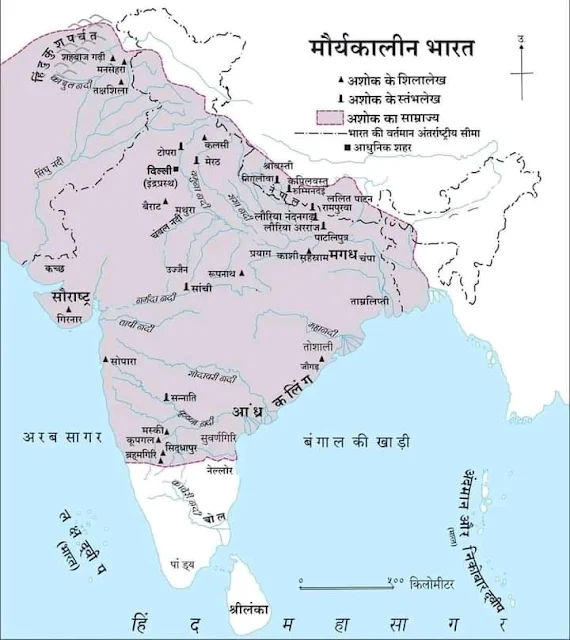Maurya Empire | मौर्य साम्राज्य क्या है ?
The Maurya Empire was one of the most powerful and influential empires in ancient India . It was founded by Chandragupta Maurya in 322 BCE and lasted for nearly 140 years until its decline in 185 BCE . During its heyday the Maurya Empire encompassed a vast territory , stretching from modern-day Afghanistan and Pakistan in the west to Bangladesh and southern India in the east . The empire was known for its strong centralized government, efficient bureaucracy and advancements in art, architecture and culture .
 |
| Maurya Empire |
The foundation of the Maurya Empire can be traced back to Chandragupta Maurya , who was a young prince from the kingdom of Magadha. Under the guidance of his mentor, the famous political strategist and economist Chanakya (also known as Kautilya), Chandragupta Maurya overthrew the ruling Nanda dynasty and established the Maurya Empire . He then went on to conquer much of northern India and expanded the empire's boundaries .
One of the most significant achievements of the Maurya Empire was the consolidation and centralization of power . Chandragupta Maurya established a strong administrative system that effectively governed the vast and diverse territories of the empire . He divided the empire into provinces each of which was governed by a viceroy appointed by the emperor . The provinces were further divided into districts , which were overseen by officials responsible for maintaining law and order, collecting taxes and administering justice .
The Maurya Empire also had a well-organized bureaucracy with a complex system of government officials and ministers responsible for various administrative tasks . This bureaucratic structure helped the empire maintain stability, enforce laws and administer the vast empire efficiently .
Under the reign of Chandragupta Maurya's grandson Ashoka the Great the Maurya Empire reached its zenith . Ashoka is widely regarded as one of the most influential and revered rulers in Indian history . He was known for his military conquests, religious tolerance and promotion of Buddhism . After a particularly bloody conquest of the kingdom of Kalinga , Ashoka renounced violence and embraced Buddhism . He then dedicated himself to spreading the teachings of Buddhism and implementing policies of non-violence, compassion and social welfare throughout the empire .
One of Ashoka's most enduring legacies is his edicts, which were inscribed on rocks and pillars throughout the empire . These edicts proclaimed his commitment to ethical governance, social justice and religious tolerance . They also provided valuable insights into the administration of the Maurya Empire and its policies on law, order and morality . The edicts were written in various Indian languages and are considered important historical documents that shed light on the cultural and religious diversity of the Maurya Empire .
The Maurya Empire made significant contributions to art and architecture . The period saw the development of the Mauryan school of art, which was characterized by the use of stone and the creation of large, monumental sculptures and architecture . The most famous example of Mauryan art is the Ashoka Pillars, which were erected in various parts of the empire and featured intricate carvings and inscriptions . The pillars are a testament to the empire's advancements in craftsmanship and architecture .
The Maurya Empire also witnessed a flourishing of culture, literature and philosophy . The period saw the rise of prominent scholars and thinkers, such as Chanakya and Panini, who made significant contributions to mathematics, linguistics and political science. The empire's official language was Sanskrit and it became a center for learning and intellectual pursuits .
The decline of the Maurya Empire began after the death of Ashoka the Great . His successors were unable to maintain the empire's unity and faced internal rebellions and external invasions . In 185 BCE, the last Mauryan ruler Brihadratha was assassinated by his military commander Pushyamitra Shunga, who established the Shunga Dynasty and ended the Mauryan rule .
Despite its eventual decline , the Maurya Empire left a lasting impact on Indian history and culture . It laid the foundation for subsequent Indian empires and dynasties and its legacy continued to influence political and social developments in India for centuries to come . The empire's achievements in governance, art, culture and philosophy have left an indelible mark on Indian civilization and continue to be studied and celebrated to this day .






